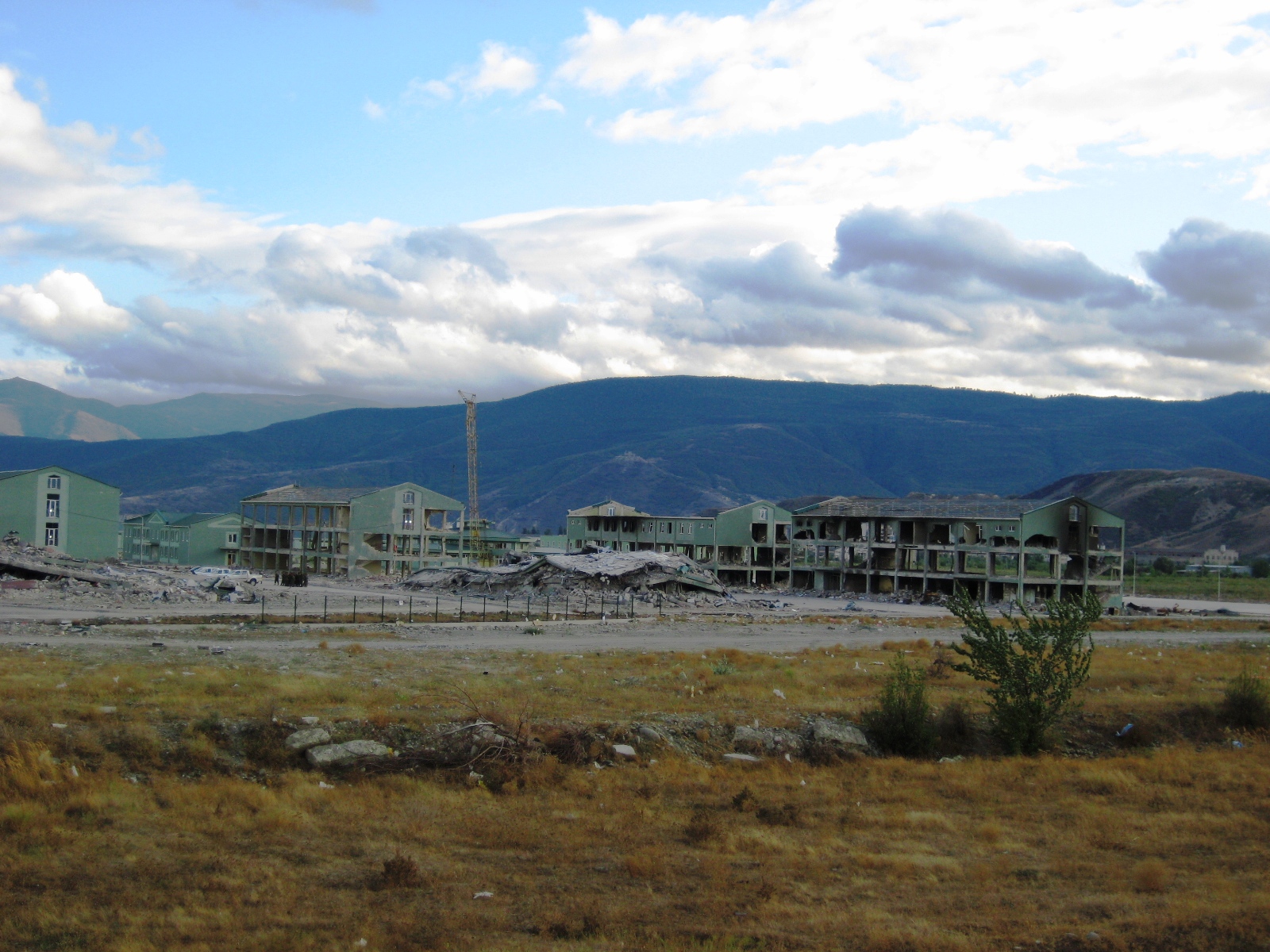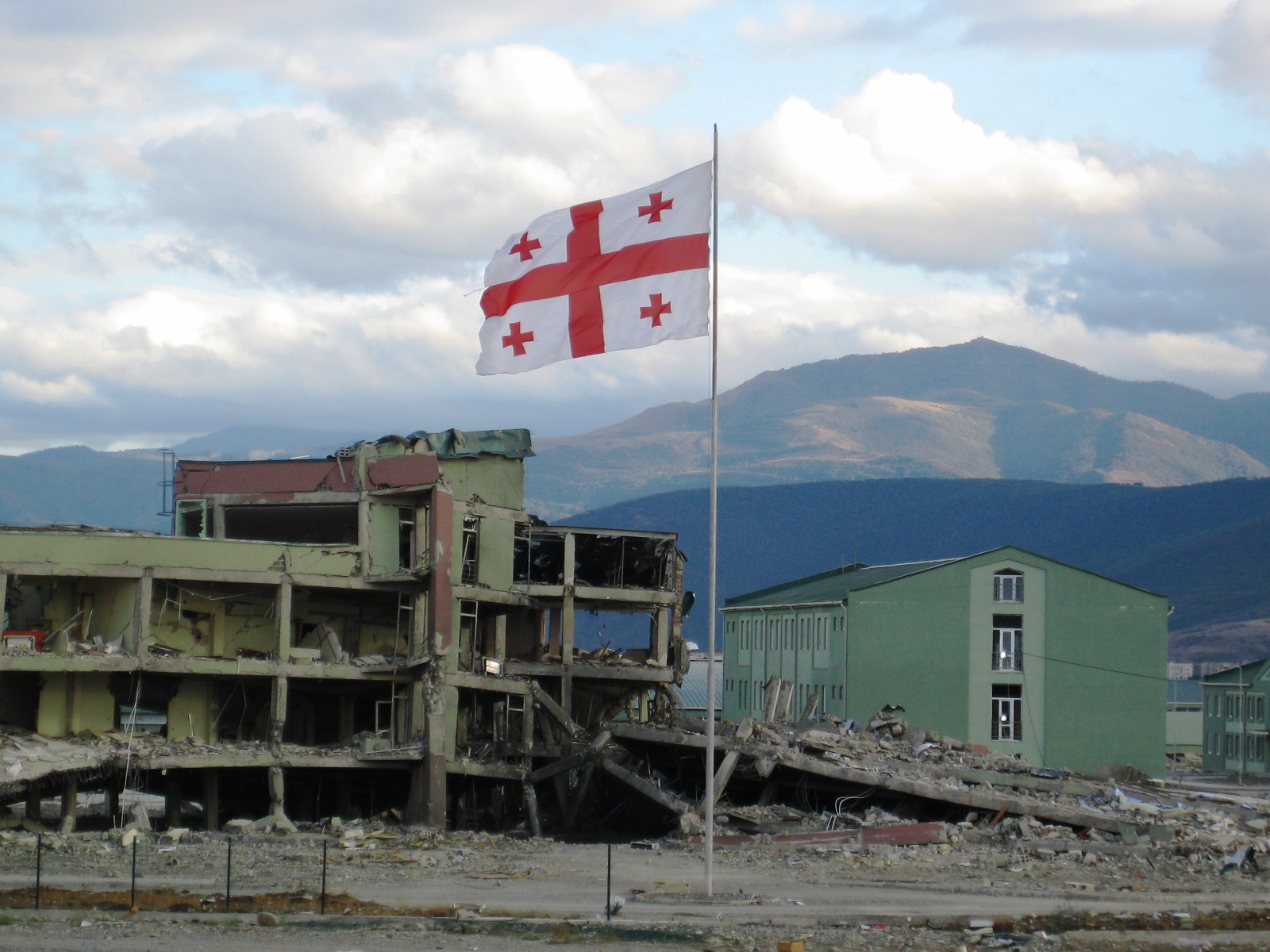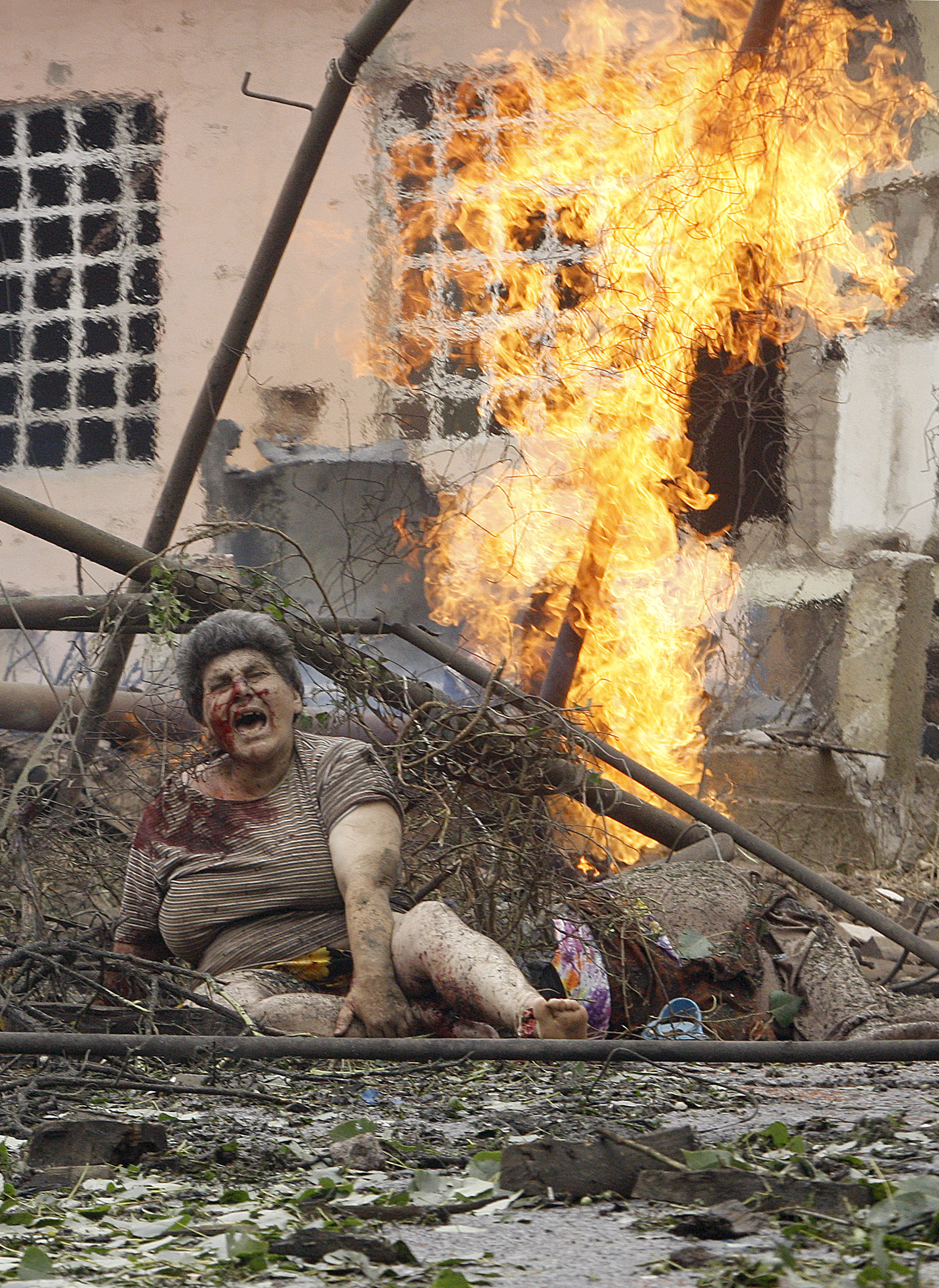Occupation of Gori on:
[Wikipedia]
[Google]
[Amazon]
The Occupation of Gori was the military occupation of Gori and its surrounding areas by Russian military forces, which started on 13 August 2008 as part of the

 Following its defeat in Tskhinvali, the Georgian Army regrouped at Gori. Georgian military entered the city on 10 August. On 10 August,
Following its defeat in Tskhinvali, the Georgian Army regrouped at Gori. Georgian military entered the city on 10 August. On 10 August,
 Several hours after the ceasefire agreement was reached, a Russian tank battalion occupied parts of Gori. Rumors of a possible attack on Tbilisi circulated. Russian troops took control of Gori on 13 August 2008. Russian troops said they were removing military hardware and ammunition from an arms depot outside Gori. A Russian armored column left Gori, traveling along the main road to Tbilisi. Russian forces then halted their advance and camped out in a field about an hour's drive from Tbilisi.
In the morning of 14 August,vehicles from the Georgian police and military prepared to re-enter Gori. Russian major general
Several hours after the ceasefire agreement was reached, a Russian tank battalion occupied parts of Gori. Rumors of a possible attack on Tbilisi circulated. Russian troops took control of Gori on 13 August 2008. Russian troops said they were removing military hardware and ammunition from an arms depot outside Gori. A Russian armored column left Gori, traveling along the main road to Tbilisi. Russian forces then halted their advance and camped out in a field about an hour's drive from Tbilisi.
In the morning of 14 August,vehicles from the Georgian police and military prepared to re-enter Gori. Russian major general
File:Tbilisi-2008-08-14.jpg, Georgian conscripts in
Russo-Georgian War
The 2008 Russo-Georgian WarThe war is known by a variety of other names, including Five-Day War, August War and Russian invasion of Georgia. was a war between Georgia, on one side, and Russia and the Russian-backed self-proclaimed republics of Sou ...
; it ended with the withdrawal of Russian units from the city on 22 August 2008.
Background and initial airstrikes
Gori is a strategic city in central Georgia, about fromTskhinvali
Tskhinvali ( ka, ცხინვალი ) or Tskhinval ( os, Цхинвал, Чъреба, Tskhinval, Chreba, ; rus, Цхинва́л(и), r=Tskhinvál(i), ) is the capital of the disputed ''de facto'' independent Republic of South Ossetia, int ...
. Gori is a major military installation and transportation hub in Georgia. 75 tanks and armored personnel carriers (a third of the Georgian military's arsenal) were assembled near Gori on 7 August.
Around 6:27 AM on 9 August 2008, Reuters reported that two Russian fighters had bombed a Georgian artillery position about 10 km north of Gori. On 9 August, a Russian air attack targeted military barracks in Gori. In the resulting explosion, besides the base, several apartment buildings and a school were also damaged. The Georgian government reported that 60 civilians were killed when bombs hit the apartment buildings. According to the Russian media, Russian aircraft dropped three bombs on an armament depot, and the façade of one of the adjacent 5-story apartment buildings suffered damage as a result of exploding ammunition from the depot. Russian aircraft had bombed at least five Georgian cities by 9 August.
Georgian abandonment

 Following its defeat in Tskhinvali, the Georgian Army regrouped at Gori. Georgian military entered the city on 10 August. On 10 August,
Following its defeat in Tskhinvali, the Georgian Army regrouped at Gori. Georgian military entered the city on 10 August. On 10 August, BBC #REDIRECT BBC #REDIRECT BBC #REDIRECT BBC
Here i going to introduce about the best teacher of my life b BALAJI sir. He is the precious gift that I got befor 2yrs . How has helped and thought all the concept and made my success in the 10th board ex ...
reported that people were leaving Gori because they feared of Russian advance towards the city. The United Nations High Commissioner for Refugees
The United Nations High Commissioner for Refugees (UNHCR) is a United Nations agency mandated to aid and protect refugees, forcibly displaced communities, and stateless people, and to assist in their voluntary repatriation, local integrati ...
(UNHCR) and World Food Programme
The World Food Programme; it, Programma alimentare mondiale; es, Programa Mundial de Alimentos; ar, برنامج الأغذية العالمي, translit=barnamaj al'aghdhiat alealami; russian: Всемирная продовольствен� ...
determined that about 80 percent of residents had left Gori as of 10 August. Russians began advancing towards Gori.
On 11 August 2008, the Georgian forces retreated from Gori. A senior Georgian security official, Kakha Lomaia, said that the troops were ordered to defend Tbilisi. Police sealed off the highway from Tbilisi, and did not allow any cars into the city. The Russian attacks were met with Georgian artillery firing towards South Ossetia, and at least six Georgian helicopters were reported to have also attacked targets in South Ossetia. A Times reporter described the Georgian withdrawal as "sudden and dramatic", saying that the "residents watched in horror" as their army abandoned their positions. Georgian tanks and armored personnel carries fled to Tbilisi. A tank exploded on the mountain road due to unspecified reasons, and an armored car pushing it out of the way also caught fire. Georgian infantry fled the city by any means available. Five soldiers escaped the city on one Quad bike
An all-terrain vehicle (ATV), also known as a light utility vehicle (LUV), a quad bike, or simply a quad, as defined by the American National Standards Institute (ANSI); is a vehicle that travels on low-pressure tires, with a seat that is strad ...
. By late 11 August, Gori was deserted after most remaining residents and Georgian soldiers had fled. Initial Georgian reports that Russian troops were in Gori, were later discounted by Georgia.
Georgian armed forces concentrated on holding Mtskheta
Mtskheta ( ka, მცხეთა, tr ) is a city in Mtskheta-Mtianeti province of Georgia. It is one of the oldest cities in Georgia as well as one of the oldest continuously inhabited cities in the World. Itis located approximately north of T ...
, from the capital Tbilisi. Deputy Defense Minister Batu Kutelia said that the defense line was being moved to Mtskheta.
The final air attacks
On 12 August 2008, a Dutch television journalist Stan Storimans was killed and another journalist injured when Russian warplanes bombed the city. As a result of the explosion 7 people were killed, over 30 were injured. Georgian officials said Russian forces had been targeting the city's administrative buildings; the university of Gori and its post office were on fire after the bombings. Russia's deputy head of the General Staff, Colonel-GeneralAnatoliy Nogovitsyn
Anatoliy Alekseevich Nogovitsyn (russian: Анатолий Алексеевич Ноговицын; 29 April 1952 – 5 November 2019) was a Russian military official. He served as the Deputy Chief of General Staff of the Armed Forces of the Russi ...
, denied that Russian forces had attacked the town. That day, a missile struck the Gori Military Hospital.
Human Rights Watch
Human Rights Watch (HRW) is an international non-governmental organization, headquartered in New York City, that conducts research and advocacy on human rights. The group pressures governments, policy makers, companies, and individual human r ...
(HRW), an international rights group, accused Russia of deploying indiscriminately deadly cluster bombs
A cluster munition is a form of air-dropped or ground-launched explosive weapon that releases or ejects smaller submunitions. Commonly, this is a cluster bomb that ejects explosive bomblets that are designed to kill personnel and destroy vehicl ...
in civilian areas.
Russian military official denied using cluster munitions. Numerous unexploded submunitions were subsequently found by local population in the Gori district and the HRW documented them.
Russian occupation
 Several hours after the ceasefire agreement was reached, a Russian tank battalion occupied parts of Gori. Rumors of a possible attack on Tbilisi circulated. Russian troops took control of Gori on 13 August 2008. Russian troops said they were removing military hardware and ammunition from an arms depot outside Gori. A Russian armored column left Gori, traveling along the main road to Tbilisi. Russian forces then halted their advance and camped out in a field about an hour's drive from Tbilisi.
In the morning of 14 August,vehicles from the Georgian police and military prepared to re-enter Gori. Russian major general
Several hours after the ceasefire agreement was reached, a Russian tank battalion occupied parts of Gori. Rumors of a possible attack on Tbilisi circulated. Russian troops took control of Gori on 13 August 2008. Russian troops said they were removing military hardware and ammunition from an arms depot outside Gori. A Russian armored column left Gori, traveling along the main road to Tbilisi. Russian forces then halted their advance and camped out in a field about an hour's drive from Tbilisi.
In the morning of 14 August,vehicles from the Georgian police and military prepared to re-enter Gori. Russian major general Vyacheslav Borisov
Vyacheslav Nikolaevich Borisov (russian: Вячеслав Николаевич Борисов: January 12, 1955 – November 4, 2021) was a Russian major-general. He took part in the 2008 Russo-Georgian War as a commanding officer in South Ossetia. ...
told Aleksandre Lomaia
Alexander "Kakha" Lomaia ( ka, ალექსანდრე ��ახალომაია) (born 1963) is a Georgian politician, diplomat and statesman, serving as Permanent Representative of Georgia to the United Nations from January 2009 t ...
, secretary of Georgia's National Security Council, that the residents of Gori were not disturbed by the Russians' presence. Later, Russian forces allowed Georgian police to return. Vyacheslav Borisov claimed that the city of Gori was controlled jointly by Georgian Police and Russian troops. He further said that Russian troops would start leaving Gori in two days. But joint patrols soon broke down because of apparent discord among personnel and the city returned to full Russian control. More than 30 police officers returned to a Georgian post outside the city.
Russian forces pushed to about from Tbilisi, the closest during the war; they stopped in Igoeti . The parts of Georgia’s army, which had manned a narrow front in the immediate vicinity down the road, maintained their positions. The Russian move coincided with the U.S. Secretary of State Condoleezza Rice’s meeting with Georgian president Saakashvili on 15 August.
"Now Ossetians are running around and killing poor Georgians in their enclaves," said Major-General Vyacheslav Borisov on 14 August. A Russian lieutenant said: "We have to be honest. The Ossetians are marauding." Answering a journalist's question, a Russian lieutenant colonel said: "We're not a police force, we're a military force. ..It's not our job to do police work." ''The New York Times'' noted, that "the Russian military might be making efforts in some places to stop the rampaging". On 17 August, BBC #REDIRECT BBC #REDIRECT BBC #REDIRECT BBC
Here i going to introduce about the best teacher of my life b BALAJI sir. He is the precious gift that I got befor 2yrs . How has helped and thought all the concept and made my success in the 10th board ex ...
reported that humanitarian aid was being delivered to the city. The Russian commander in Gori said his troops were staying to prevent looting and would leave when Georgian police was ready to take over.
According to the Hague Convention, an occupying power has to insure public order and safety in the occupied areas. The Russian human rights group Memorial
A memorial is an object or place which serves as a focus for the memory or the commemoration of something, usually an influential, deceased person or a historical, tragic event. Popular forms of memorials include landmark objects or works of a ...
called the attacks by South Ossetian militia "pogrom
A pogrom () is a violent riot incited with the aim of massacring or expelling an ethnic or religious group, particularly Jews. The term entered the English language from Russian to describe 19th- and 20th-century attacks on Jews in the Russia ...
s".
Russian pullout of Gori
The last Russian military formations left the city late on 22 August 2008, and Georgianlaw enforcement
Law enforcement is the activity of some members of government who act in an organized manner to enforce the law by discovering, deterring, rehabilitating, or punishing people who violate the rules and norms governing that society. The term en ...
units moved into Gori shortly thereafter.
Tbilisi
Tbilisi ( ; ka, თბილისი ), in some languages still known by its pre-1936 name Tiflis ( ), is the Capital city, capital and the List of cities and towns in Georgia (country), largest city of Georgia (country), Georgia, lying on the ...
after retreating from Gori
File:Ruins of a burnt apartment building in Gori.jpg, A burnt apartment building where 16 people were reportedly killed
File:A Russian missile lies largely intact in a home in Gori.jpg, The propulsion stage
Stage or stages may refer to:
Acting
* Stage (theatre), a space for the performance of theatrical productions
* Theatre, a branch of the performing arts, often referred to as "the stage"
* ''The Stage'', a weekly British theatre newspaper
* Sta ...
of a Russian missile in a civilian apartment on August 25, 2008
File:Georgian-war-pics.jpg, Pictures on display outside the Georgian parliament showing the destruction after Russian bombings in Gori
References
{{reflist, 3 Russo-Georgian War Cluster bomb attacks Gori Gori Gori Military occupation Gori, Georgia August 2008 events in Asia Russian war crimes in Georgia (country) Gori